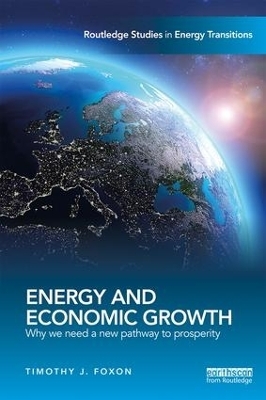
Energy and Economic Growth
Routledge (Verlag)
978-1-138-66930-7 (ISBN)
Access to new sources of energy and their efficient conversion to provide useful work have been key drivers of economic growth since the industrial revolution. Western countries now need to transform their energy systems and move away from the single-minded pursuit of economic growth in order to reduce our carbon emissions, and to allow the environmental space for other countries to develop in a more sustainable way. Achieving this requires understanding of the dynamics of economic and industrial change with appreciation of the dependence of economies on ecological systems.
Energy and Economic Growth thus examines the links between three issues: history of energy sources, technologies and uses; ecological challenges associated with the current dominant economic growth paradigm; and the future low carbon energy transition to mitigate human-induced climate change. Providing a historical understanding of the relevant connections between physical, social and economic changes, the book enables the reader to better understand the connection between their own energy use and global economic and environmental systems, and to be able to ask the right questions of our political and business leaders.
This is a valuable resource for students, scholars and policy makers with an interest in energy, climate change and economic thinking.
Timothy J. Foxon is Professor of Sustainability Transitions at SPRU (Science Policy Research Unit), University of Sussex, UK. He previously held academic and research positions on sustainability and innovation at the University of Leeds, University of Cambridge and Imperial College London. He has a PhD in theoretical physics from the University of Cambridge.
Part I: Key issues
1. Introduction – Challenges of climate change and economic growth.
2. What is energy and why is it important for the economy?
3. Assessing the role of energy in long-term industrial change.
Part II: Long waves of energy-industrial change
4. Pre-industrial energy systems.
5. The first industrial revolution – water and steam power.
6. Electrification and the rise of oil.
7. Rise of the consumer society.
Part III: Implications for economic development
8. Energy and economic growth – a positive feedback system.
9. Insights for a low carbon energy transformation.
Part IV: Future challenges
10. Future energy pathways and issues.
11. Economic growth and beyond.
12. Can we rise to the challenge?
| Erscheinungsdatum | 18.12.2017 |
|---|---|
| Reihe/Serie | Routledge Studies in Energy Transitions |
| Zusatzinfo | 2 Tables, black and white; 13 Line drawings, black and white; 15 Illustrations, black and white |
| Verlagsort | London |
| Sprache | englisch |
| Maße | 156 x 234 mm |
| Gewicht | 272 g |
| Themenwelt | Naturwissenschaften ► Biologie ► Ökologie / Naturschutz |
| Sozialwissenschaften ► Soziologie ► Spezielle Soziologien | |
| Technik ► Elektrotechnik / Energietechnik | |
| Technik ► Umwelttechnik / Biotechnologie | |
| Wirtschaft ► Volkswirtschaftslehre | |
| ISBN-10 | 1-138-66930-X / 113866930X |
| ISBN-13 | 978-1-138-66930-7 / 9781138669307 |
| Zustand | Neuware |
| Haben Sie eine Frage zum Produkt? |
aus dem Bereich


